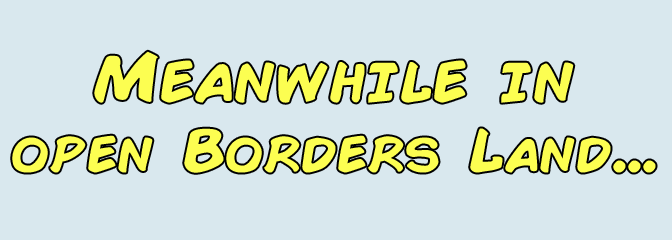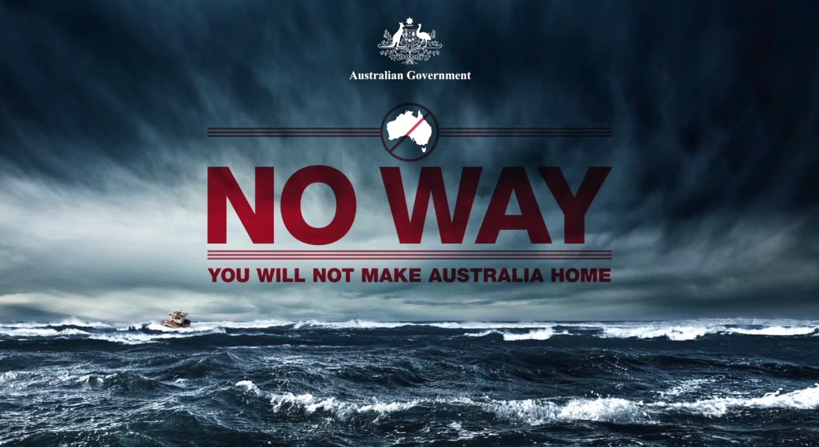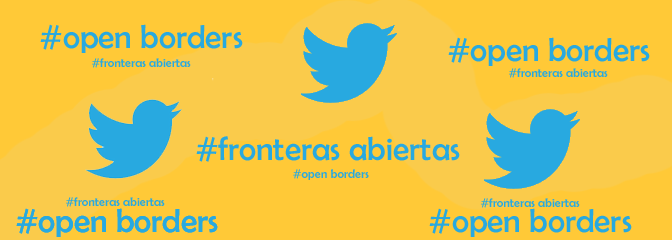At EconLog, Bryan Caplan responds, in defense of tolerance, to my earlier post, where I had distanced myself from tolerance as a moral and political ideal. Of course, I approve much of what is done, and more importantly, not done, in the name of tolerance, but I would choose different words to express the grounds for my approval.
This is partly a substantive disagreement and partly arises from difficulties in definitions, and Caplan does good service by clarifying the latter. I had argued that “tolerance is subject to this paradox: that a society cannot be tolerant without being intolerant of intolerance,” which I illustrate with an example of a society where 95% of people tolerate both gays and anti-gay violence: such tolerance isn’t worth having. One way out is to define tolerance as respect for others’ rights, but Caplan dismisses this because “a homophobe who spends every day peacefully denouncing gays as disgusting and vile” would, implausibly, be “tolerant” by this definition. Instead, Caplan proposes that:
Tolerance is not strongly opposing what people (especially strangers) do with their own person and property. [To which I think Caplan implicitly means to add: as long as it doesn’t interfere with the person and property of someone else.]
Well done! If I’d thought of this definition before, I would have written the earlier post differently. I think this definition largely defuses the “paradox of tolerance” that I identified earlier. An individual or a society that was tolerant in this sense could still be resolute in defending the natural rights of minorities, while also tolerating the attitudes of intolerant minorities, as long as they remained merely attitudes, not actions.
What, then, is intolerance? What’s the negative of the above definition? Maybe this:
Intolerance is strongly opposing what people (especially strangers) do with their own person and property [even when it doesn’t interfere with the person and property of someone else].
While I find the definition useful as a way to clarify the discussion, I don’t find it as linguistically compelling as Caplan does. Thus, Caplan writes…
Return to Nathan’s hypothetical: A gang physically attacks a gay man. A bystander pulls his gun and tells them to back off. Morality aside, it seems linguistically odd to accuse the bystander of “intolerance.”
… but (in my view) it would be odd to “accuse” the bystander of intolerance only because one accuses people of doing bad things, whereas pulling the gun on the gang was a good, courageous action. I don’t think it would be odd to praise the gunman for his intolerance of violence against gays. I could imagine him becoming a local hero, and the town boasting, “See! We don’t tolerate violence against gays around here!”
And by the way, if we take Caplan’s definition straight, without modifying it with my bracketed clause, it would imply that the gunman is intolerant. He is “strongly opposing what other people”– the gang– “do with their persons”– their arms, fists, whatever– “and property”– any weapons they might be using. Only if we assume the extra clause about “when it doesn’t interfere…” is the gunman not a case of intolerance.
In general, I see nothing odd in saying that American society is intolerant of wife-beating, child abuse, and slavery, and that these are among its virtues. I find this to be a rather precise and useful way of expressing an important point. Similarly, open borders advocates want to make the world intolerant of migration restrictions.
Still, if we accept Caplan’s definition of tolerance (with my clarifying clause), an interesting disagreement remains. Caplan strongly favors tolerance, in theory and– on the basis of all my personal interactions with him– in practice. (It’s a genial feature of many libertarians that, whatever one is doing, as long as it doesn’t involve asking the government for any help, they approve of you.) I’m ambivalent about it.
Caplan offers five arguments in defense of tolerance, of which I’ll focus on three:
1. People’s moral objections to how others use their own persons and property are often greatly overstated, or simply wrong.
2. People’s moral objections to how others use their own persons and property are usually superfluous because the Real World provides ample punishment.
3. Intolerance is bad for the intolerant, because being angry at others makes you unhappy.
Caplan admits that his arguments are “not watertight.” Or as I would put it, they are wise and true, except when they’re not.
To (1): yes, of course, it’s undesirable for people to make moral objections to the behavior of others if those objections are mistaken; but correct moral objections may be very desirable. And while people are often mistaken in all sorts of moral judgments, I’m not at all sure that they’re more likely to be correct in moral judgments concerning themselves and those close to them, as they are in moral judgments concerning strangers. People have more of a certain kind of information in their own case, but also more bias.
To (2): yes, vice often (in the eternal Christian perspective, always, except by the grace of God) carries its own punishment; but people are usually much better off if they don’t have to “learn the hard way” (a fortiori in the eternal Christian perspective). Sex is a standard example. Suppose young people feel certain very powerful urges, while a vast literature attests to the disastrous consequences of acting on them. Yes, if society doesn’t scare a girl into chastity by strongly opposing premarital sex, then she’s likely to learn the benefits of chastity ex post through the travails of single motherhood. Similarly, the lazy man may realize after ten years of playing video games in his mom’s basement that his poverty, low social status, and lack of marriage prospects are his own fault, and vow to reform. But he’s lost ten years, and has to overcome a lot of bad habits. He might have been much better off if the insults of contemptuous strangers had shaken him into moral maturity back when he was twenty. Of course, people don’t necessarily learn the right moral lessons even with a lag. They might lead impoverished lives till the day they die, because their neighbors are too tolerant to educate them in the way of virtue.
To (3): Yes, intolerance is not a pleasant feeling, but is it one’s intolerant attitudes, or someone else’s offensive behavior, that is to blame? Simplifying somewhat, a person confronted with offensive behavior has three options: tolerate, oppose, or withdraw. Manipulating oneself psychologically so as to reduce, or possibly eliminate, one’s felt disgust at the offensive behavior, is not costless. You may never feel as good as you would if the offensive behavior stopped. Strongly opposing the offensive behavior may assuage the conscience of a truthful person as silence would not, and better yet, it might cause the offensive behavior to cease. If so, very importantly, it spares others, not just oneself, from the offensive behavior. I may tolerate the chatterer in the classical music concert, hoping he’ll just stop, but I’m grateful to the man who confronts him with an angry “Shhhh!”
As for withdrawal, I’m not sure whether it qualifies as tolerant or not. It seems to fit Caplan’s definition, but would we consider a person “tolerant” whose invariable response, upon finding out that someone is gay, is quietly but irrevocably to terminate the acquaintance? I’m not sure. Caplan and I are enthusiastic Bubble-dwellers, and I’ve come more and more to congratulate myself on the virtues of my immediate circle of acquaintance relative to American society generally. But part of what makes my bubble so nice is that lewdness, blasphemy, and vitriol against undocumented immigrants are not tolerated there. Now, if I can satisfy the duty of tolerance by withdrawal, that’s some comfort. But isn’t it a bit harsh for those from whom I withdraw, to be ostracized without knowing why. At least sometimes, mightn’t it be better to tell them what they’re doing wrong? Then they have the option of changing their behavior to keep my acquaintance, or if not, at least they know why they lost it.
As usual, Jesus sets the right example here. Up to a point, Jesus was tolerant in Caplan’s sense. He never seems to have sought out people who were minding their own business and started blasting them for their sins. He did seek out some and gently call them: “As He was going along by the Sea of Galilee, He saw Simon and Andrew… And Jesus said to them, ‘Follow Me'” (Mark 1:16-17). He taught “Judge not, that ye be not judged” (Matthew 7:1), and illustrated it with a beautiful, rather comic parable about not taking a speck out of your brother’s eye when there is a log in your own. He drove the money changers out of the temple by force (Matthew 21:12), but the temple is a special place, and He doesn’t seem to have interfered with them anywhere else. He was most intolerant of the teachers of the law and the Pharisees– “You snakes! You brood of vipers! How will you escape being condemned to Hell?” (Matthew 23:33) But their problem is that they were hypocrites, that is, they were constantly condemning others in the name of the law, without practice it themselves:
“The teachers of the law and the Pharisees sit in Moses’ seat. So you must be careful to do everything they tell you. But do not do what they do, for they do not practice what they preach. They tie up heavy, cumbersome loads and put them on other people’s shoulders, but they themselves are not willing to lift a finger to move them.” (Matthew 32: 2-4)
Scathing condemnation of hypocrites seems appropriate. Surely people who spend their lives condemning others in the name of a law they themselves are not observing, deserve to be condemned. And inasmuch as people on the receiving end of the Pharisees’ self-righteous condemnations were troubled and oppressed thereby, it might be impossible to relieve them without attacking the Pharisees’ moral authority at the root. But when Jesus was presented with the woman caught in adultery in John 8, He was merciful. “Neither do I condemn you,” He said, but also “Go and sin no more” (John 8:1). Should He have said, “Free love is OK,” or “It’s none of my business what you do with your own body?” Would that have been comforting? Would that have been loving? If sin destroys happiness and damns the soul, one who fails even to advise against it is deficient in mercy. If tolerance means not warning someone that they’re driving over a cliff, it is no virtue. All in all, I think Jesus’s practice is close to tolerance in Caplan’s sense, but not quite the same. But then, Caplan specially advocates “moderate benevolence,” as opposed to loving every stranger as your own child. Jesus did love everyone as His own children, so He couldn’t be quite as tolerant.
While “intolerance” has an unpleasant sound, “moral suasion” sounds nicer. But moral suasion is a form of nonviolent intolerance, and as such, it is an alternative to coercion which libertarians should find attractive. Would you rather private racism be eliminated by pervasive intolerant attitudes of racism, or by a police state reading people’s e-mails and bugging their homes? How about pollution, littering, or loud parties at night? Surely it’s better if communities can deal effectively with negative externalities non-coercively, through intolerant attitudes towards anti-social behavior, than if preventing negative externalities becomes the job of an invasive nanny state.
Bryan Caplan and Vipul Naik seem to feel there’s a connection between tolerance and open borders. I think the two ideas are largely orthogonal: one can argue from any side of either question to any side of the other without about equal plausibility. Here are a few of the possible arguments:
1. Tolerance => Open borders. We shouldn’t strongly oppose anything that people do with their own persons or property. Therefore we shouldn’t restrict immigration. (But this will seem question-begging to a proponent of the collective property rights argument against freedom of migration.)
2. Tolerance => Migration restrictions. Tolerant moral and social values are a distinctive Western achievement which will be diluted if we let in foreigners from less tolerant cultures. So we should keep most foreigners out.
3. Intolerance => Migration restrictions. Foreigners engage in many repugnant practices. We should exclude most of them to avoid being offended by these practices. In this connection, someone suggested that I take the opportunity to score points against the horrible Hans Herman Hoppe, godfather of restrictionist (pseudo?) libertarianism by this quote from Democracy: The God That Failed:
There can be no tolerance toward democrats and communists in a libertarian social order. They will have to be physically separated and expelled from society. Likewise, in a covenant founded for the purpose of protecting family and kin, there can be no tolerance toward those habitually promoting lifestyles incompatible with this goal. They–the advocates of alternative, non-family and kin-centred lifestyles such as, for instance, individual hedonism, parasitism, nature-environment worship, homosexuality, or communism–will have to be physically removed from society, too, if one is to maintain a libertarian order.
Shudder. But anyway…
4. Intolerance/Moral suasion => Open borders. Immigrants will bring with them some practices that are morally wrong, or distasteful. It will often be impractical and/or unjust to use force to reform them. Fortunately, intolerant attitudes are a good substitute for legal force. Our strong disapproval of offensive practices will often suffice to make immigrants abandon them. Indeed, one of the benefits of open borders is precisely that a lot of people will come under the influence of our disapproval, and be effectually pressured to conform to our higher moral standards. By contrast, if they remain in their home countries, they will be too far away to notice and be influenced by our disapproval. That may injure our peace of mind to the extent that we know of these practices, but even if they don’t bother us psychically when they’re far away, practices that are really, objectively moral evils should be stopped.
I can’t prove it, but I suspect that the Victorian Age was better able to accommodate open borders in part because it was more socially intolerant, e.g., of blasphemy or sexual license. Strong normative values that pervaded society made the Victorians better able to assimilate immigrants. Also, a civil society strong in its normative values did some of what the modern welfare state does, so the welfare objection to open borders wasn’t a factor in the way it is today.






![t1larg.sfax.boat.gi.afp[1]](http://openborders.info/wp-content/uploads/2015/01/t1larg.sfax_.boat_.gi_.afp1_.jpg)


